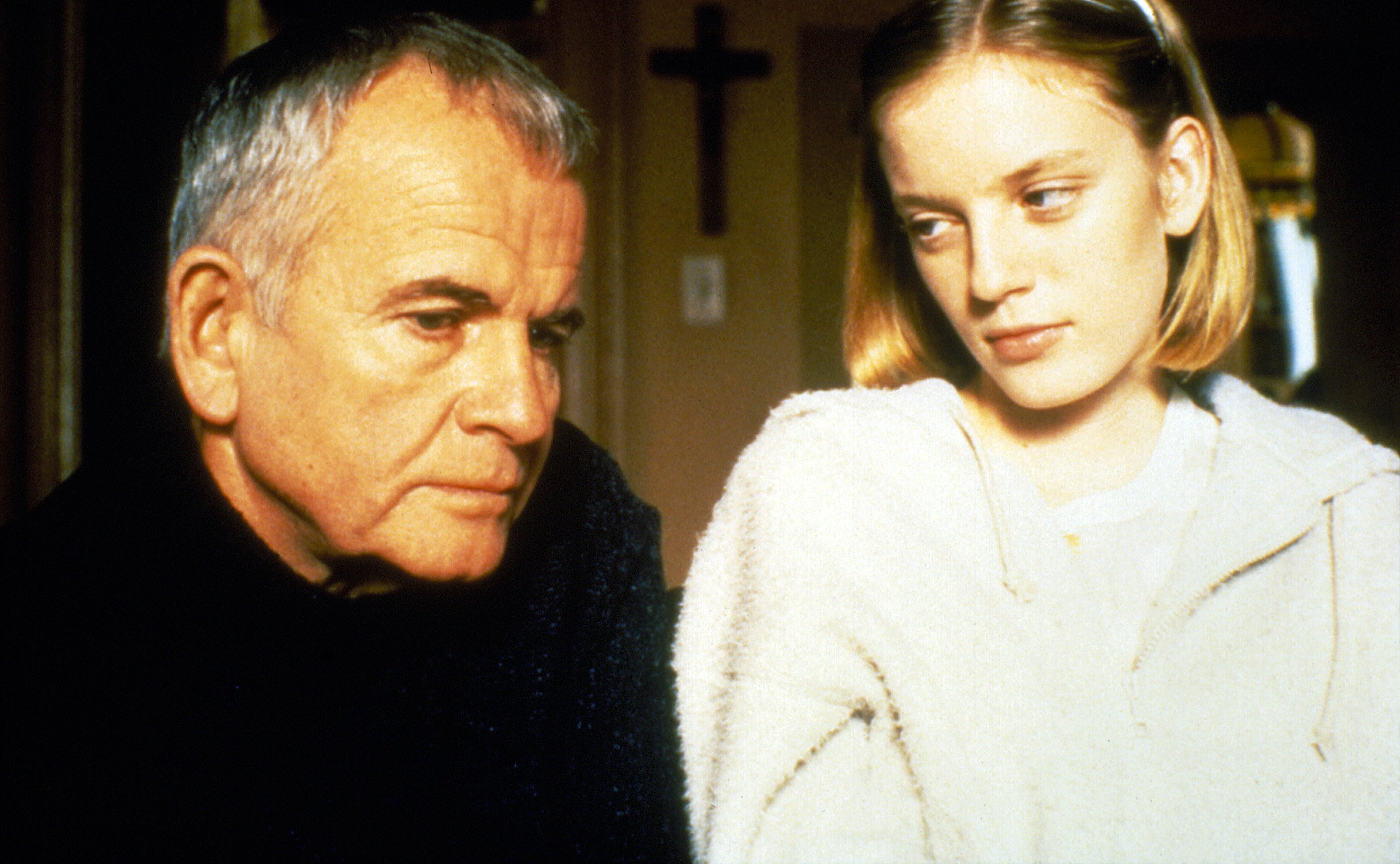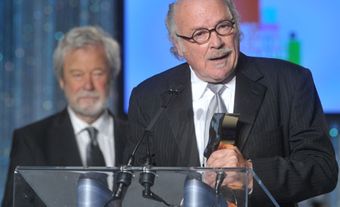
Synopsis
Based on the book by Russell Banks, The Sweet Hereafter recounts the fictional events leading up to and following a school bus accident that kills 14 children in a small town in the British Columbia interior. The story follows the families whose lives irrevocably change and a big-city lawyer, Mitchell Stephens (Ian Holm), who hopes to sign them up for a class-action lawsuit. In the ensuing atmosphere of suspicion, guilt and doubt, a surviving teenager named Nicole (Sarah Polley), who has lost the use of her legs in the accident, regains her strength and dignity and, by telling a lie, reunites the community.
Background
Russell Banks’s novel was based on a 1989 bus crash in Alton, Texas, that claimed the lives of 21 children and resulted in a series of lucrative settlements that fractured the community. After Egoyan read the book — a birthday gift from his wife, Arsinée Khanjian — he felt determined to adapt it, but discovered that Fox Searchlight had already optioned it. He met Banks through a mutual friend, author Margaret Atwood, and acquired the rights from him after Searchlight rejected the script they had commissioned and their option on the book expired.
The Sweet Hereafter was the first screenplay that Egoyan adapted from another source. In addition to relocating the action of the novel from upstate New York to the BC interior, he reordered the narrative structure in a non-linear fashion and added readings from The Pied Piper of Hamelin as a framing device. Donald Sutherland was originally cast as Mitchell Stevens, but he withdrew from the film 10 days before shooting began and was replaced by Ian Holm.
Analysis
Egoyan’s adaptation of Banks’s complex tale of guilt and redemption is told from multiple points of view, and the cast, which includes Bruce Greenwood, Tom McCamus, Maury Chaykin and Arsinée Khanjian, is impeccable. But it is Holm’s central performance as the tragic, deeply flawed lawyer that stands out and holds the rest together like a magnet. This is a film about the living dead, about people carrying on with their lives after hope and meaning have gone. It is an unflinching lament for the human condition, and is so sad, so tender toward its characters, that the ending packs an emotional wallop.
Critical Reception
Critics greeted The Sweet Hereafter with almost universal praise. Time magazine’s Richard Schickel described it as, “A solemn, subtly structured, beautifully acted and ultimately hypnotic movie.” Roger Ebert called it, “one of the best films of the year, an unflinching lament for the human condition.” Entertainment Weekly’s Owen Gleiberman said that the film “Leaves you shaken and ecstatic at the same time, transported by the vision of a major film artist.” Janet Maslin of the New York Times wrote that, “For all the suffering it describes, this eloquent film also carries the exhilaration of crystal-clear artistic vision.”
The film generated a great deal of positive word of mouth in the United States, culminating in Egoyan’s two Oscar nominations, despite grossing less than $4 million at the North American box office. It also generated controversy and a good deal of critical analysis over its depiction of the incestuous relationship between Nicole and her father (Tom McCamus), which came across to many as consensual (see Atom Egoyan (Profile).

Honours and Legacy
One of the most honoured Canadian films of all time, The Sweet Hereafter won eight Genie Awards, including best picture, director and actor (Ian Holm). It earned Academy Award nominations for adapted screenplay and director — the first time a Canadian has been nominated in the director category for a Canadian feature. It also won the Best Canadian Feature Film Award at the 1997 Toronto International Film Festival, and three major prizes at the 1997 Cannes Film Festival.
The Sweet Hereafter was ranked No. 11 in Premiere magazine’s 2007 list of the “25 most dangerous movies ever made,” defined as “galvanizing experiences that place squarely in your face all the stuff Hollywood usually presumes you go to the movies to get away from… Consciousness-expanders, in other words, but rarely in a pleasant way.”
It was voted the best Canadian film of all time in a Playback readers’ poll in 2002, and ranked in the top five in polls of the Top 10 Canadian films of all time conducted by the Toronto International Film Festival (TIFF) in 2004 and 2015. In 2016, it was named one of 150 essential works in Canadian cinema history by a poll of 200 media professionals conducted by TIFF, Library and Archives Canada, the Cinémathèque québécoise and The Cinematheque in Vancouver in anticipation of the Canada 150 celebrations in 2017.
See also: Atom Egoyan (Profile 1997); Atom Egoyan (Profile 1999);Canadian Feature Films.
Awards
1997 Genie Awards
Achievement in Cinematography (Paul Sarossy)
Achievement in Editing (Susan Shipton)
Achievement in Music/Original Score (Mychael Danna)
Achievement in Overall Sound (Ross Redfern, Daniel Pellerin, Keith Elliott, Peter Kelly, Tony Van Den Akker)
Achievement in Sound Editing (Sue Conley, Steve Munro, Andy Malcolm, Goro Koyama, David Drainie Taylor)
Performance by an Actor in a Leading Role (Ian Holm)
Achievement in Direction (Atom Egoyan)
Best Motion Picture (Camelia Frieberg, Atom Egoyan)
Others
FIPRESCI Prize, Cannes Film Festival (1997)
Grand Prize of the Jury, Cannes Film Festival (1997)
Prize of the Ecumenical Jury, Cannes Film Festival (1997)
Best Canadian Feature Film (tied with The Hanging Garden), Toronto International Film Festival (1997)
Best Canadian Film or Video Over 60 Minutes (tied with The Hanging Garden), Atlantic Film Festival (1997)
Best Supporting Actress (Sarah Polley), Boston Society of Film Critics Awards (1997)
Best Film, Ft. Lauderdale International Film Festival (1997)
Golden Spike Award, Valladolid International Film Festival (1997)
Youth Jury Award, Valladolid International Film Festival (1997)
Best Actor (Ian Holm), Kansas City Film Critics Circle Awards (1997)
Best Film, Society of Texas Film Critics Awards (1997)
Best Director (Atom Egoyan), Society of Texas Film Critics Awards (1997)
Best Acting by an Ensemble, National Board of Review (1997)
Top Ten Films, National Board of Review (1997)
Best Picture, Toronto Film Critics Association Awards (1998)
Best Canadian Film, Toronto Film Critics Association Awards (1998)
Best Performance, Male (Ian Holm), Toronto Film Critics Association Awards (1998)
Best Director (Atom Egoyan), Toronto Film Critics Association Awards (1998)
WGC Award (Atom Egoyan), Writers Guild of Canada (1998)
Best Foreign Film, Independent Spirit Awards (1998)

 Share on Facebook
Share on Facebook Share on X
Share on X Share by Email
Share by Email Share on Google Classroom
Share on Google Classroom


